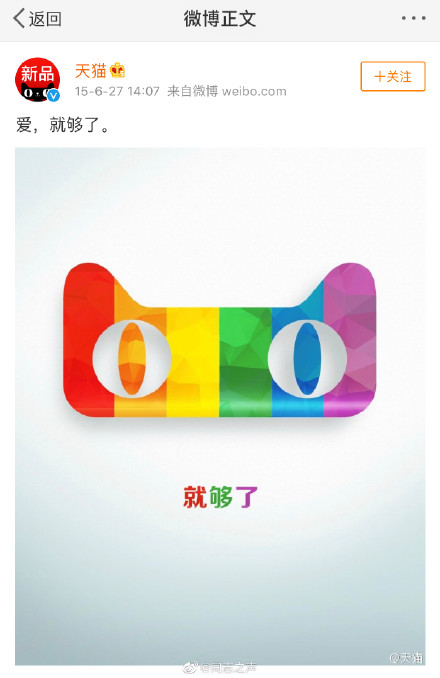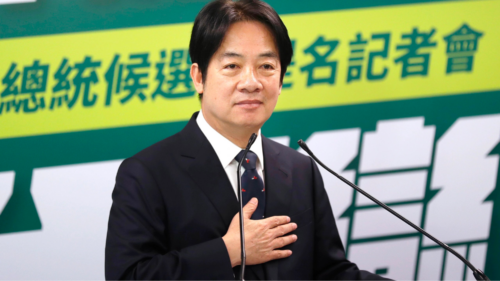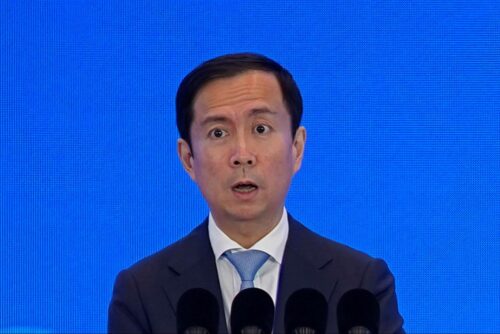Alibaba features gay couple in Chinese New Year ad campaign for Tmall
Alibaba features gay couple in Chinese New Year ad campaign for Tmall

Tmall, an online marketplace owned by Chinese tech giant Alibaba, has been showered with praise — especially from the LGBT community — after releasing a Chinese New Year–themed commercial that features a same-sex couple, which is very rare in ad campaigns by Chinese brands.
In a series of commercials that advertise Tmall’s special deals for the upcoming Spring Festival, one installment (in Chinese) depicts a common occasion during the holiday season, where young people bring their partners home to meet their parents. But instead of taking a conventional approach of portraying a hetreosexual couple, the video puts two men in a homosexual relationship at the center.
The 23-second video starts with a young man introducing another man as “Kevin” to his family members. “Tonight we are blessed with some ‘scoops,’” two girls in the home respond, giggling and exchanging knowing glances. While sitting at the dinner table, the protagonist’s father hands a bowl of soup to Kevin, saying, “Make yourself at home.” In response, the young man says, “Thank you, Dad.” The commercial ends with the big reveal, which is met with surprised looks around the table.

The clip was released earlier this week and started to gain traction after a Weibo post (in Chinese) made by @LoveMatters, a blogger who gives advice on dating and relationships, who wrote, “Thank you, Tmall, for showing support for sexual-minority groups. It helps to bring more visibility to these communities and make them recognized by the public.”
The video has been widely circulated on social media, racking up millions of views and an avalanche of positive feedback. “I’m totally here for it! Some people might say it’s a small step to test the boundary, but I see it as a big leap forward,” a Weibo user wrote. Profoundly touched by the commercial, another internet user got personal in this comment: “I wept from this. I wish I could bring him home.”
When contacted by CNN for comment, Alibaba denied creating the commercial with a gay theme in mind. “Chinese New Year is a time for family reunion and inclusion, and the ad is a creative expression to celebrate such an occasion,” the company said.

But there’s evidence that Alibaba actively sought to disseminate the commercial among LGBT consumers. On January 9, Gay Voices, one of Weibo’s major LGBT accounts, with more than 1.8 million followers, revealed (in Chinese) that Tmall paid 5,000 yuan ($720) for the sponsored content and that it would donate the money to its hotline project, which delivers advice, support, and information services to the LGBT community.
CNN also noted that this is not the first time that Alibaba has tried to be more inclusive of LGBT individuals in its commercials. In 2015, Taobao, another Alibaba-owned ecommerce platform, collaborated with the gay dating app Blued to sponsor Chinese gay couples to travel to California to get married. “As long as you have true love, Taobao will help you realize the dream,” read the campaign’s tagline. In the same year, Tmall subtly incorporated sexual orientation into an image of its mascot by painting it in rainbow colors. “Love will be enough,” the accompanying caption read.
While China decriminalized homosexuality in 1997 and declassified it as a mental disorder in 2001, a truly inclusive society remains a distant dream for the Chinese LGBT community. On the legal front, China has no law banning discrimination on the grounds of sexual orientation, which leaves many LGBT Chinese subject to prejudice and unfair treatment in the workplace.
But it’s also worth noting that there have been some strides for LGBT rights in China in recent years. Last month, China’s top legislative body said that it had been advised to include the legalization of same-sex marriage in the civil code when it solicited public opinions. Meanwhile, a growing number of same-sex couples in China are naming their partners as legal guardians, which serves as an alternative way to gain legal recognition for their relationships.






